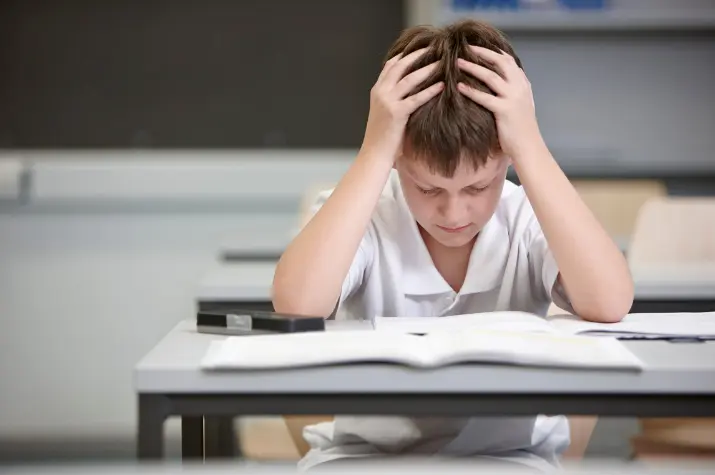
Let’s talk about something really important today – the mental well-being of our children. With the world changing at an unprecedented pace, it’s no secret that our kids are facing more challenges than ever before.
With over 2.7 million kids aged 12 to 17 suffering from severe depression in the past year alone.
Though we often get caught up in the hustle and bustle of our daily lives, we must take a moment to pause and reflect on how our children are doing mentally.
In this article, we’ll explore six key signs that your child may be struggling with mental health issues.
Trust us, this is a must-read for all parents, caregivers, and community members who want to ensure the well-being of our children. So, let’s dive in!
You may also like:
- Mental Health Misdiagnoses In Children
- 6 Creative Ways You Can Document Your Child’s Growth
- Important Health Checkups to Keep in Mind for Your Child
6 Signs Your Child Is Struggling With Mental Health

1. Changes in Behavior
It’s important to keep an eye out for any changes in behaviour that your child may be exhibiting. If you notice your child suddenly withdrawing from social activities, becoming more irritable, or displaying mood swings that seem out of character, it’s worth paying attention to.
These changes could be an indication of underlying emotional distress or anxiety. Take help from professionals like PsychiCare for child behaviour issues.
2. Decline in Academic Performance
Just wanted to share some information about academic performance. It’s not uncommon for children to experience a decline in grades or struggle with schoolwork, but if it happens suddenly and consistently, it could be a sign of underlying mental health issues.
Kids who have difficulty concentrating, completing assignments, or retaining information might benefit from further evaluation. It’s always important to keep an eye on your child’s academic progress and reach out for help if you notice any concerning changes.
3. Physical Symptoms
Sometimes, children may experience physical symptoms that are related to their mental health. These symptoms could be in the form of headaches, stomachaches, or other unexplained physical ailments. If you notice your child complaining about such symptoms frequently, and these coincide with changes in their mood or behavior, it’s important to keep an eye out for any underlying emotional distress. While it’s not always necessary that these symptoms are directly linked to mental health issues, they could be important indicators of an underlying problem.
4. Loss of Interest
I think it’s important to talk about how a sudden loss of interest in activities or hobbies that your child once enjoyed can be an indication of something deeper. It can be a sign of mental health issues or other underlying problems. If your child has stopped showing enthusiasm for things they once loved, it might be a good idea to have an open conversation with them to understand what’s going on. You can ask psychologists at PsychiCare for underlying issues.
5. Changes in Sleep Patterns
If you notice that your child is having difficulty falling asleep, waking up frequently during the night, or sleeping excessively, it might be worth seeking professional help if these patterns persist. Getting enough rest is important for overall health and well-being, and addressing sleep disturbances early on can help prevent further mental health challenges down the road.
6. Expressing Negative Thoughts
Just wanted to remind you – it’s always a good idea to listen carefully to what your child is saying, especially when it comes to expressing negative thoughts. Sometimes, these thoughts can be a sign of something more serious than just typical teenage angst, so it’s important not to dismiss them. If you notice any signs of hopelessness, worthlessness, or self-harm, it’s crucial to seek immediate support from a mental health professional.
Importance of Early Intervention

Early intervention is crucial for your child’s mental health. The developing brain is like a young plant – the earlier you address any issues, the stronger and healthier it will grow. By addressing mental health concerns early, you can prevent long-term consequences and set your child on the path to a healthy and fulfilling life.
Untreated mental health issues in childhood can have a ripple effect, leading to difficulties in adulthood such as substance abuse, relationship problems, and even physical health issues.
Early intervention programs teach children valuable skills like emotional regulation, communication, and problem-solving, which are beneficial throughout their lives. These skills empower them to navigate challenges and feel happier on a day-to-day basis.
What To Do If You’re Concerned
If you’re worried about your child’s mental health, talk to them openly and create a safe space for them to express themselves. Schedule an appointment with their therapists who can refer you to a mental health professional if needed.
There are also many reputable websites like PsychiCare and support groups available to learn more and find help. Remember, you’re not alone, and taking action early can make a positive impact on your child’s well-being.
Final Thoughts
Recognizing the signs of struggling mental health in children is vital for providing timely support and intervention. Parents and caregivers can address potential mental health issues early on by paying attention to changes in behavior, academic performance, physical symptoms, interests, sleep patterns, and expressions of negative thoughts.
It’s important to create an open and supportive environment where children feel comfortable expressing their feelings and concerns. Encouraging communication and seeking professional help when necessary can make a significant difference in a child’s well-being.
About The Author:
Stacey Smith is a freelance health writer. She is passionate about writing about women’s health, dental health, diabetes, endocrinology, and nutrition and provides in-depth features on the latest in health news for medical clinics and health magazines.




